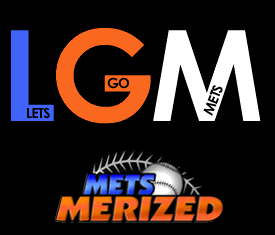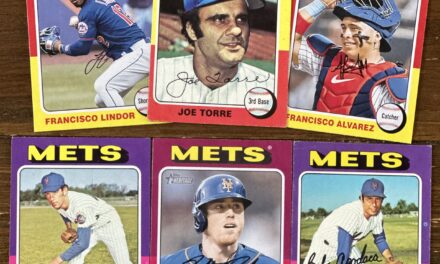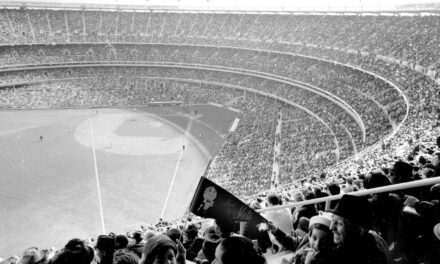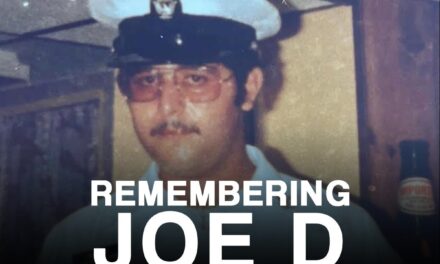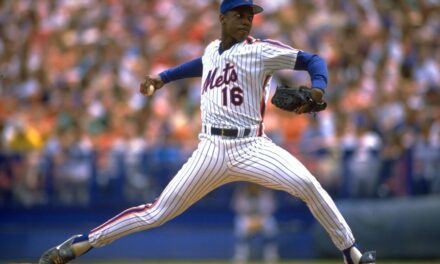
A trade, not involving the Mets, happened 31 years ago this past July. It was between the San Francisco Giants and the San Diego Padres, with the Giants acquiring Kevin Mitchell and pitchers Dave Dravecky and Craig Lefferts in exchange for pitchers Keith Comstock, Mark Davis, and Mark Grant. The prize in the trade for the Giants was intended to be Dravecky, and although he would turn out to have a good career, the true blue-chip would turn out to be ex-Met Kevin Mitchell. He was a two-time All-Star and league MVP with San Francisco in 1989. But the foundation–and some of his failures– were rooted 458 miles south of the Golden Gate City in San Diego where Mitchell was born and raised. The New York Mets would become an integral part of this foundation.
As a teenager, Kevin Darnell Mitchell was troubled academically, migrating from school to school. He would eventually fall into a gang-style life where the violence that ensued resulted in Mitchell receiving several gunshot wounds. His one outlet was baseball, and although he never played for a high school team, was noticed by Mets’ scouts at an open tryout. He was signed as an undrafted free agent by the team.
Mitchell started his career for Kingsport in the Appalachian League in 1981. He would proceed up the ladder in the minors until he reached Triple-AAA Tidewater in 1984. After a stellar minor league career, he slumped at Tidewater batting only .243. In September, with the rosters expanded, Mitchell was called up to the Mets, starting two games at third base with while going 3-14 at the plate. In 1985, the Mets had a lefty-righty platoon at third with Howard Johnson and Ray Knight, and this kept Mitchell at Tidewater for the entire season, his fifth as a professional. He raised his BA nearly 50 points to .290 in ’85.
In spring training prior to the 1986 season, Mitchell was one of the Mets best hitters batting .333 in a limited role. But with the platoon, it looked as if was destined to remain at Tidewater. Mets’ manager Davey Johnson made sure that did not happen, and tried Mitchell in the outfield as well as other infield positions. His new found versatility worked and Kevin Mitchell was asked to join the Mets as they came north in April.
Mitchell was used mostly as a pinch-hitter for the Mets in the early part of the season, making only five starts in April. Through mid-June, he had only 94 ABs, hitting .330 with 12 extra base hits, 14 RBIs and 14 runs scored. However as the month progressed, Mitchell became red hot at the plate batting .500 (18-36) in a 13 game span. it was becoming harder and harder for Davey Johnson not to play him every day. The events of July 22 at Riverfront Stadium in Cincinnati made Johnson’s dilemma easier.
The Mets and the Cincinnati Reds played a tense extra-inning affair. Eric Davis came entered the game to pinch-run for Pete Rose who had singled in the bottom of the tenth. Davis proceeded to steal second and then third where he slid hard into Ray Knight. The Mets’ third-baseman took exception and punched Davis in the face and an all-out brouhaha resulted as both benches emptied. Mitchell was in the middle of it all going after mostly the Reds’ starting pitchers. One player who did not move from the bench was left-fielder George Foster. This angered Johnson, and Foster was benched and Mitchell became the Mets everyday left-fielder. Later that year Foster, who had been a Met since 1982, was released.
Off the field, some of Mitchell’s self-professed ‘anger issues’ occurred as he was said to have killed his girlfriend’s cat after a heated fight. This news first came to light in Mets’ pitcher Dwight Gooden‘s autobiography Heat which also accused Mitchell of holding him “hostage” throughout the affair. The relationship between Gooden and Mitchell was never the same and some point to this incident as the first seed of the Mitchell trade to the Padres.
During the 1986 post-season, Mitchell recorded only two hits in both the NLCS against the Houston Astros and in the World Series against the Boston Red Sox. The second hit he stroked against the Sox is well known in Mets lore. It was game six of the Series with Boston up three games to two. Boston had scored two runs in the top of the tenth inning to take the lead and had their right-handed closer, Calvin Schiraldi, on the mound. He quickly retired Wally Backman and Keith Hernandez and the Sox were one out away from the title.
Mitchell was said to have gone to the clubhouse, get out of his uniform, and call for flight plans to San Diego as he felt the game and the Series were over. But Gary Carter kept the inning alive with a single and Davey Johnson wanted Mitchell to follow as a pinch-hitter. Mookie Wilson found him and told him he was batting next. He quickly redressed and came to bat and promptly singled. He would later score the tying run on a wild pitch by Bob Stanley who relieved Schiraldi. Mookie Wilson followed with the slow roller that Bill Buckner no doubt still has nightmares about. The Mets won the game and went on to also win game seven and were World Champions for the second time.
A few weeks later, Mets’ management decided they wanted to protect Darryl Strawberry in the line-up and targeted Padres’ outfielder Kevin McReynolds. The front office also felt Mitchell was a negative influence on both Gooden and Strawberry. Johnson disagreed, and was strongly against trading Mitchell. However, Mets GM Frank Cashen disregarded his manager’s pleas, and a scant six weeks after the Mets parade down the Canyon of Heroes, Kevin Mitchell was traded to the Padres as part of a giant seven-player trade.
The Mets got their man in McReynolds who would go on to have five good seasons with the Mets, but never leading them to a championship. Mitchell would be later traded to the Giants and became an all-star and the National League MVP in 1989 with 47 HRs, 125 RBIs, and an OPS of 1.023. He was the first Giant to be named MVP since Willie McCovey in 1969. Mitchell led the Giants to a World Series that year. He is the only player in Major League history to win an MVP and play for at least five separate teams before his 32nd birthday. He would go onto play for eight teams in the majors in his 13-year career and even played in Japan for a short stint.
Unfortunately, after his career was over, Mitchell was charged with three separate crimes involving alleged rape and two charges of misdemeanor battery. Mitchell never saw any jail time, but was ordered to perform community service and take anger management classes. Today, he teaches young kids about the game he loves so much.
Kevin Mitchell was a prodigy in some player’s eyes. Gary Carter nicknamed him “World” because he could play nearly anywhere on the diamond. He only played one full season with the Mets, and many experts feel the team would have won more than just one championship had he stayed. That will never be known. But what is known is that Mitchell contributed a hit for the Mets in 1986 that kept hearts from breaking and scored a run that is often overlooked. The Mets have not won a World Series since his departure. Perhaps it is because their ‘world’ was gone.
